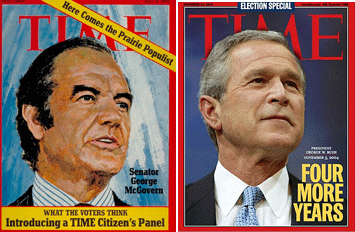
Pundits thrive on “what if” scenarios. “What if” George W. Bush had not charged with General Custer bluster into Saddam’s Iraq over four years ago? “What if” we just up and pulled out right now? The other day, trying to balance my checkbook, I wondered “what if” my grandfather had bought shares in a tin-Lizzied start-up company called Ford Motor Company? I also remember my first election in 1972 when I enthusiastically voted for George McGovern for President. “What if” George McGovern had not been slimed and dimed by the new and yet to be watergate-downed Nixon and his Kissenger messenger? I mention McGovern, one of those rare Presidential candidates who has never had a taint of corruption, because last October he published a piece on the Iraq War in Harper’s Magazine. Had his advice been followed, we would be out of Iraq right now. So it seems relevant to ask “what if” we return and read his comments again.
The Way Out of War:
A blueprint for leaving Iraq nowby George S. McGovern
Harper’s Magazine, October, 2006Staying in Iraq is not an option. Many Americans who were among the most eager to invade Iraq now urge that we find a way out. These Americans include not only civilian “strategists†and other “hawks†but also senior military commanders and, perhaps most fervently, combat soldiers. Even some of those Iraqis regarded by our senior officials as the most pro-American are determined now to see American military personnel leave their country. Polls show that as few as 2 percent of Iraqis consider Americans to be liberators. This is the reality of the situation in Iraq. We must acknowledge the Iraqis’ right to ask us to leave, and we should set a firm date by which to do so.
We suggest that phased withdrawal should begin on or before December 31, 2006, with the promise to make every effort to complete it by June 30, 2007.
Withdrawal is not only a political imperative but a strategic requirement. As many retired American military officers now admit, Iraq has become, since the invasion, the primary recruiting and training ground for terrorists. The longer American troops remain in Iraq, the more recruits will flood the ranks of those who oppose America not only in Iraq but elsewhere.
Withdrawal will not be without financial costs, which are unavoidable and will have to be paid sooner or later. But the decision to withdraw at least does not call for additional expenditures. On the contrary, it will effect massive savings. Current U.S. expenditures run at approximately $246 million each day, or more than $10 million an hour, with costs rising steadily each year. Although its figures do not include all expenditures, the Congressional Research Service listed direct costs at $77.3 billion in 2004, $87.3 billion in 2005, and $100.4 billion in fiscal year 2006. Even if troop withdrawals begin this year, total costs (including those in Afghanistan) are thought likely to rise by $371 billion during the withdrawal period. Economist Joseph Stiglitz and Linda Bilmes, a former assistant secretary of commerce, have estimated that staying in Iraq another four years will cost us at least $1 trillion.
Let us be clear: there will be some damage. This is inevitable no matter what we do. At the end of every insurgency we have studied, there was a certain amount of chaos as the participants sought to establish a new civic order. This predictable turmoil has given rise to the argument, still being put forward by die-hard hawks, that Americans must, in President Bush’s phrase, “stay the course.†The argument is false. When a driver is on the wrong road and headed for an abyss, it is a bad idea to “stay the course.